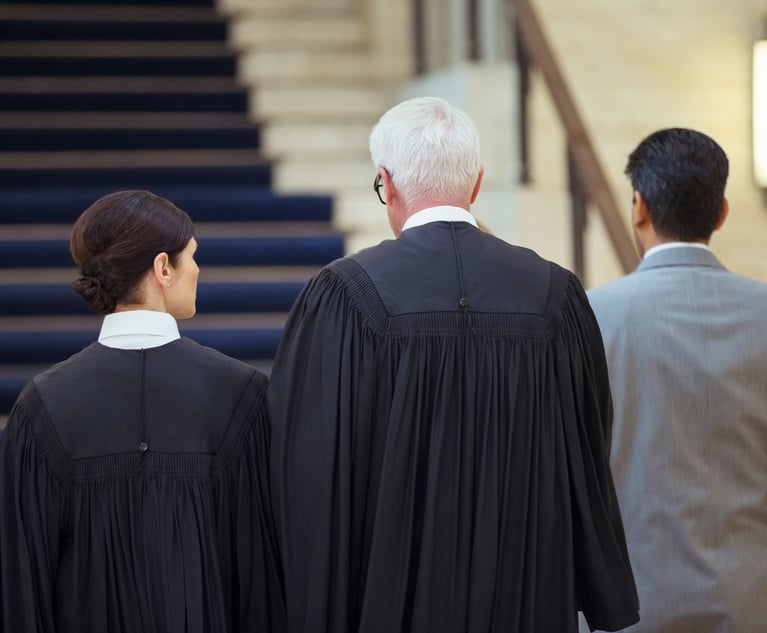Judicial Ethics Opinion 20-71
A judge may serve on the board of directors of a regional chapter of the Polish American Congress.
June 15, 2020 at 03:04 PM
5 minute read
The Advisory Committee on Judicial Ethics responds to written inquiries from New York state's approximately 3,600 judges and justices, as well as hundreds of judicial hearing officers, support magistrates, court attorney-referees, and judicial candidates (both judges and non-judges seeking election to judicial office). The committee interprets the Rules Governing Judicial Conduct (22 NYCRR Part 100) and, to the extent applicable, the Code of Judicial Conduct. The committee consists of 27 current and retired judges, and is co-chaired by former associate justice George D. Marlow of the Appellate Division and the Honorable Margaret Walsh, a justice of the Supreme Court.
Digest: A judge may serve on the board of directors of a regional chapter of the Polish American Congress
Rules: 22 NYCRR 100.2; 100.2(A); 100.2(D); 100.4(A)(1)-(3); 100.4(C)(3); 100.4(C)(3)(a)(i)-(ii); 100.4(C)(3)(b)(i), (iv); 100.4(G); Opinions 19-105; 16-179; 15-210/09-56; 15-171; 14-29; 03-138; 00-76; 99-77; 98-101; 97-19; 96-82.
Opinion:
The inquiring full-time judge has been invited to serve on the board of directors of a regional chapter of the Polish American Congress, which is organized as a 501(c)(3) not-for-profit charitable organization. In its efforts to "promote the Polish-American community and relations with Poland," the Congress, among other things, monitors legislation and policies potentially affecting Polish-Americans; informs its members about specific legislative developments and, where relevant, organizes a unified response from the Polish-American community; supports the bilateral trade relationship between the United States and Poland and promotes business development beneficial to both nations; and coordinates efforts aimed at affecting legislation of importance to Poland and the Polish-American community, such as NATO expansion and the inclusion of Poland in the visa waiver program. In addition, the Congress promotes awareness of Polish-American history; supports Polish-American educational and cultural activities; provides charitable relief to Poland, especially in response to natural disasters; sponsors contact between American and Polish leaders and institutions; opposes bigotry against Polish-Americans and Poland; and promotes cultural, political, and religious dialogue with other ethnic and racial groups in the United States.
A judge must always avoid even the appearance of impropriety (see 22 NYCRR 100.2) and must always act to promote public confidence in the judiciary's integrity and impartiality (see 22 NYCRR 100.2[A]). A judge may generally engage in extrajudicial activities if they do not cast reasonable doubt on the judge's ability to act impartially, do not detract from the dignity of judicial office, and do not interfere with the proper performance of judicial duties and are not incompatible with judicial office (see 22 NYCRR 100.4[A][1]-[3]). A judge may be a member of an educational, religious, charitable, cultural, fraternal, or civic organization not conducted for profit (see 22 NYCRR 100.4[C][3]) and may serve as an officer, director, or non-legal advisor of such an organization provided the organization is unlikely to be engaged in proceedings that ordinarily would come before the judge and, in the case of a full-time judge, is unlikely to be engaged regularly in adversary proceedings in any court (see 22 NYCRR 100.4[C][3][a][i]-[ii]). A judge may be a member of "an organization …dedicated to the preservation of religious, ethnic, cultural or other values of legitimate common interest to its members" (22 NYCRR 100.2[D]), but not one "that practices invidious discrimination" (id.).
In Opinion 97-19, we concluded that, absent evidence that the organization practiced invidious discrimination, there was no ethical bar to a judge's service on the board of Irish-Americans in Government, Inc., whose objective was "to preserve and publicize the history of the accomplishments and contribution to public service of Irish-Americans" (Opinion 97-19). As described, the Congress is devoted to public service and improvement of its members, with no suggestion of exclusionary practices (see Opinion 15-171), and it opposes bigotry against Polish-Americans (cf. Opinion 16-179 [concluding an entity "does not invidiously discriminate, as it in fact expands volunteer opportunities for women to reach parity with men"]). Here, too, where there is no evidence of invidious discrimination (see Opinion 96-82 [describing relevant considerations]), the Congress's focus on Polish-Americans does not violate 22 NYCRR 100.2(D).
Because a judge should not be publicly associated "with organizational positions on matters of public controversy" (Opinion 98-101), service as an officer or director of a not-for-profit civic or charitable organization will be prohibited if the organization is involved in controversial issues incompatible with judicial office (see Opinion 99-77; see also Opinion 15-210/09-56 [even where membership in a local chapter of Shooters' Committee on Political Education is permitted, judge may not serve on its board]) or "engage[s] in lobbying, advocacy and litigation that can generate public controversies" (Opinion 14-29 [judge may not hold leadership position in a "non-partisan feminist coalition" which advocates for and influences legislative and social policy affecting women and children but may be a regular member of the organization and may attend meetings or events]). In the Committee's view, supporting the interests of Polish-Americans is uncontroversial (cf. Opinion 19-105 [judge's service on board of not-for-profit organization that "advocates for effective policies and drives evidence-based solutions for the health, education and success of children," with a special commitment to "children who are vulnerable because of poverty, racism, health disparities and trauma," does not involve judge in matters of substantial public controversy and is therefore permitted]).
Finally, there is no indication that the Polish American Congress will be engaged in proceedings that ordinarily would come before the inquiring judge or that the organization is likely to be engaged regularly in adversary proceedings in any court (see 22 NYCRR 100.4[C][3][a][i]-[ii]).
Accordingly, the judge may serve on the board of directors of his/her local chapter of the Polish American Congress. Of course, whether as a board member or otherwise, the judge may not personally participate in fund-raising (see 22 NYCRR 100.4[C][3][b][i], [iv]) or provide legal advice (see 22 NYCRR 100.4[G] [prohibition on full-time judge]; Opinions 03-138; 00-76).
This content has been archived. It is available through our partners, LexisNexis® and Bloomberg Law.
To view this content, please continue to their sites.
Not a Lexis Subscriber?
Subscribe Now
Not a Bloomberg Law Subscriber?
Subscribe Now
NOT FOR REPRINT
© 2024 ALM Global, LLC, All Rights Reserved. Request academic re-use from www.copyright.com. All other uses, submit a request to [email protected]. For more information visit Asset & Logo Licensing.
You Might Like
View AllTrending Stories
- 1Call for Nominations: Elite Trial Lawyers 2025
- 2Senate Judiciary Dems Release Report on Supreme Court Ethics
- 3Senate Confirms Last 2 of Biden's California Judicial Nominees
- 4Morrison & Foerster Doles Out Year-End and Special Bonuses, Raises Base Compensation for Associates
- 5Tom Girardi to Surrender to Federal Authorities on Jan. 7
Who Got The Work
Michael G. Bongiorno, Andrew Scott Dulberg and Elizabeth E. Driscoll from Wilmer Cutler Pickering Hale and Dorr have stepped in to represent Symbotic Inc., an A.I.-enabled technology platform that focuses on increasing supply chain efficiency, and other defendants in a pending shareholder derivative lawsuit. The case, filed Oct. 2 in Massachusetts District Court by the Brown Law Firm on behalf of Stephen Austen, accuses certain officers and directors of misleading investors in regard to Symbotic's potential for margin growth by failing to disclose that the company was not equipped to timely deploy its systems or manage expenses through project delays. The case, assigned to U.S. District Judge Nathaniel M. Gorton, is 1:24-cv-12522, Austen v. Cohen et al.
Who Got The Work
Edmund Polubinski and Marie Killmond of Davis Polk & Wardwell have entered appearances for data platform software development company MongoDB and other defendants in a pending shareholder derivative lawsuit. The action, filed Oct. 7 in New York Southern District Court by the Brown Law Firm, accuses the company's directors and/or officers of falsely expressing confidence in the company’s restructuring of its sales incentive plan and downplaying the severity of decreases in its upfront commitments. The case is 1:24-cv-07594, Roy v. Ittycheria et al.
Who Got The Work
Amy O. Bruchs and Kurt F. Ellison of Michael Best & Friedrich have entered appearances for Epic Systems Corp. in a pending employment discrimination lawsuit. The suit was filed Sept. 7 in Wisconsin Western District Court by Levine Eisberner LLC and Siri & Glimstad on behalf of a project manager who claims that he was wrongfully terminated after applying for a religious exemption to the defendant's COVID-19 vaccine mandate. The case, assigned to U.S. Magistrate Judge Anita Marie Boor, is 3:24-cv-00630, Secker, Nathan v. Epic Systems Corporation.
Who Got The Work
David X. Sullivan, Thomas J. Finn and Gregory A. Hall from McCarter & English have entered appearances for Sunrun Installation Services in a pending civil rights lawsuit. The complaint was filed Sept. 4 in Connecticut District Court by attorney Robert M. Berke on behalf of former employee George Edward Steins, who was arrested and charged with employing an unregistered home improvement salesperson. The complaint alleges that had Sunrun informed the Connecticut Department of Consumer Protection that the plaintiff's employment had ended in 2017 and that he no longer held Sunrun's home improvement contractor license, he would not have been hit with charges, which were dismissed in May 2024. The case, assigned to U.S. District Judge Jeffrey A. Meyer, is 3:24-cv-01423, Steins v. Sunrun, Inc. et al.
Who Got The Work
Greenberg Traurig shareholder Joshua L. Raskin has entered an appearance for boohoo.com UK Ltd. in a pending patent infringement lawsuit. The suit, filed Sept. 3 in Texas Eastern District Court by Rozier Hardt McDonough on behalf of Alto Dynamics, asserts five patents related to an online shopping platform. The case, assigned to U.S. District Judge Rodney Gilstrap, is 2:24-cv-00719, Alto Dynamics, LLC v. boohoo.com UK Limited.
Featured Firms
Law Offices of Gary Martin Hays & Associates, P.C.
(470) 294-1674
Law Offices of Mark E. Salomone
(857) 444-6468
Smith & Hassler
(713) 739-1250










